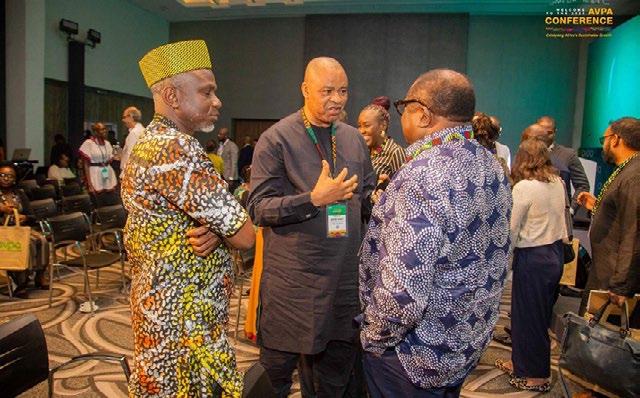
4 minute read
STAKEHOLDER ENGAGEMENTS
Stakeholder engagement is central to the missions of both PIND and NDPI. NDPI staff actively support PIND in select international stakeholder engagements, contributing to the success and reach of these initiatives. Below are highlights of some key engagements that exemplify these collaborative efforts:

2024 AVPA Summit: Championing Regenerative Partnerships for Sustainable Impact
In November 2024, the Niger Delta Partnership Initiative (NDPI) and the Foundation for Partnership Initiatives in the Niger Delta (PIND) played a pivotal role at the African Venture Philanthropy Alliance (AVPA) Summit in Nairobi, Kenya. As sponsors and knowledge partners, NDPI and PIND joined a diverse assembly of development practitioners, social investors, and philanthropic leaders from across Africa to explore forward-thinking strategies for sustainable and inclusive development on the continent.
PIND took center stage during a high-level panel session titled “African Non-Profits and Regenerative Partnerships: Building and Maintaining Collaborative Relationships for Sustainable Impact,” held on Tuesday, November 5. This strategic session highlighted innovative approaches to fostering long-term, regenerative collaborations among African non-profits, governments, donors, and the private sector.
Representatives from NDPI and PIND shared valuable insights drawn from PIND’s multi-stakeholder programming in the Niger Delta, showcasing innovations in impact investment, peacebuilding, and inclusive market systems development. Aline Varre, NDPI’s Director of Business Development Services, delivered a compelling presentation on “Leveraging Impact Investment for Sustainable Community Development.” She introduced PIND’s upcoming regenerative impact investment initiative, designed to stimulate growth among small and medium-sized enterprises (SMEs) in sectors such as energy, market systems, and youth employment. Her remarks underscored the critical role of peacebuilding and stakeholder collaboration in achieving resilient community outcomes—an approach that defines PIND’s emerging identity as a regenerative impact investor.
Through its active participation in the AVPA Summit, PIND reinforced its leadership in driving systemic change in the Niger Delta and also reaffirmed its dedication to knowledge exchange and ecosystem development across Africa. This engagement aligns with PIND’s strategic objective of shaping the narrative around regenerative development and mobilizing blended capital to drive enduring socio-economic transformation.

NDPI Foundation at the 2024 Powering Africa
Summit Washington, D.C. | DAI Panel, Youth Energy Summit Roundtable
As part of its ongoing commitment to advancing sustainable energy access and investment in the Niger Delta, the NDPI Foundation actively participated in the 2024 Powering Africa Summit held in Washington, D.C. Represented by Aline Varre, Director of Strategy and Business Development, and Maputi Botlhole, Special Projects Coordinator, NDPI contributed to two key sessions: a panel discussion titled “Can Data Transform Financing for a Sustainable Energy Transition?” and the Youth Energy Summit Roundtable.
These sessions convened leaders from across sectors to examine the pivotal role of data in mobilizing capital for clean and decentralized energy systems throughout Africa. PIND’s involvement highlighted its leadership in leveraging evidencebased models and ecosystem-driven strategies to attract private sector investment into inclusive, energy-enabled development initiatives.
During the panel, Aline Varre emphasized the transformative potential of data in shaping investor confidence by aligning project design and implementation with financing criteria. She remarked, “Data is the new infrastructure. If we treat it as such, we can unlock energy financing at scale, aligned with both investor requirements and the realities of marginalized communities.” She also referenced NDPI’s longstanding collaboration with DAI, particularly the 2015 Electricity Value Chain study and subsequent model-sharing workshops, which significantly influenced the strategy of Nigeria’s Rural Electrification Agency and spurred interest among energy developers.
PIND’s behind-the-scenes work in mapping energy usage across agro-industrial clusters—such as milling hubs and palm oil processing centers—was presented as a compelling example of how behavioral insights can guide targeted investments. Furthermore, data from mini-grid deployments and environmental-social impact assessments have been instrumental in refining investment strategies, especially for coastal and remote communities that have historically been excluded from electrification efforts.







